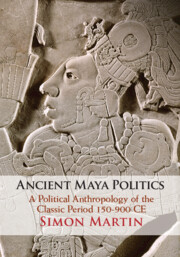Book contents
- Ancient Maya Politics
- Ancient Maya Politics
- Copyright page
- Dedication
- Contents
- Illustrations
- Maps
- Tables
- Case studies
- Preface
- One Introduction: The Questions
- Part I Agendas in Classic Maya Politics
- Part II Epigraphic Data on Classic Maya Politics
- Five Identity
- Six Constitution
- Seven Transcendence
- Eight Matrimony
- Nine Conflict
- Ten Hierarchy
- Eleven Coda
- Part III A Political Anthropology for the Classic Maya
- Appendix An Inventory of Emblem Glyphs
- Notes
- References
- Index
Ten - Hierarchy
from Part II - Epigraphic Data on Classic Maya Politics
Published online by Cambridge University Press: 13 July 2020
- Ancient Maya Politics
- Ancient Maya Politics
- Copyright page
- Dedication
- Contents
- Illustrations
- Maps
- Tables
- Case studies
- Preface
- One Introduction: The Questions
- Part I Agendas in Classic Maya Politics
- Part II Epigraphic Data on Classic Maya Politics
- Five Identity
- Six Constitution
- Seven Transcendence
- Eight Matrimony
- Nine Conflict
- Ten Hierarchy
- Eleven Coda
- Part III A Political Anthropology for the Classic Maya
- Appendix An Inventory of Emblem Glyphs
- Notes
- References
- Index
Summary
Thus far, we have examined the titular composition, sustaining practices, and cohering concepts of the Classic Maya polity, before moving to its external relations in the form of interdynastic alliances and warfare. But we have not yet exhausted the range of inter-polity contacts in the inscriptions, and a final category takes us to the heart of how individual kingdoms were drawn into larger political configurations. Here I explore the asymmetrical relations of power that suffused the divided landscape of the Classic Maya.
Information
- Type
- Chapter
- Information
- Ancient Maya PoliticsA Political Anthropology of the Classic Period 150–900 CE, pp. 237 - 276Publisher: Cambridge University PressPrint publication year: 2020
